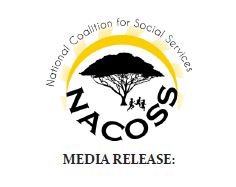
MEDIA RELEASE:
WORLD NGO DAY 27th of February 2024
Thirty years into democracy, NPOs are facing the same challenges. World NGO Day on the 27 February is about celebrating the successes and achievements of NGOs and to showcase the important work that they do. There are 280,329 NGOs registered with the Department of Social Development in South Africa, and this sector is facing a bleak future with ever decreasing financial support from governments. The 2024 national budget cuts threaten the very existence of these valuable services.
The NACOSS (National Coalition of Social Services) national Chairperson, Mrs Adrie Vermeulen, provided a thought provoking report at the Annual General Meeting of NACOSS held on the 21st of February 2024. The message is clear; the role of NGOs is changing. Mrs Vermeulen referred to an article in the Mail & Guardian almost 10 years ago regarding the relevance and role of NGOs twenty years after the new democracy. The article predicted that there would be increased lack of funding. Now, 30 years later with a sense of dread and disbelief, NGOs are facing the same situation. For the past thirty years, the NGO funding crisis has been a frequent topic of discussion and debate. The NGO sector’s role has evolved from advocating during the apartheid era to working with the government to develop policies that would help our new democracy restore a just and equal society based on fundamental human rights. The collaboration or relationship between the government and NGOs is shifting yet again as the value and continued existence of NPOs are being called into question and government is taking over more and more services from NPOs.
The results of a 2020 literature review demonstrated the value of NGOs by pointing out that they provide a variety of services in the areas of human rights, education, health, social assistance, environmental conservation, and disaster relief. Secondly, they help the government reach more residents who would find it difficult to use government services. Thirdly, by providing a wide range of necessary goods and services, sustaining NGOs boosts the economy (Choto, Iwu, and Robertson, 2020). Fourthly, NGOs connect the most disadvantaged with resources, expertise, and skills. Non governmental organisations (NGOs) fill in the gaps left by the government or work to address issues that could otherwise be disregarded as a fifth value. NGOs assist the government to fulfil its Constitutional and statutory duties to the people of this nation.
A shocking event occurred at the start of the previous year when the Gauteng province’s Department of Social Development experienced a sharp reduction in funding, which forced some of NACOSS’ member organisations to close essential services. The Gauteng Crisis Care Committee (GCCC) was established as a ray of hope emerging from this tragedy. This Committee has reclaimed the NGO sector’s advocacy role and turned into a voice of reason and optimism for all of us. NACOSS has witnessed first hand the disastrous results of political and bureaucratic choices that infringe upon the rights of member’s beneficiaries. The harm brought about by these careless decisions continued even after the subsidies were restored. When new service level agreements need to be signed in the upcoming weeks in order to decide NGOs’ future this coming financial year, the next section of this chapter will become clear. With the anticipated reductions in subsidies, a dismal future appears to be lurking in several of the provinces in South Africa.
Amidst the turmoil and fear of the unknown, the NGO sector still manages to provide services to vulnerable populations and keeps on being resilient. Mrs Vermeulen warned that without the NGO sector, the welfare system will collapse, and less people will have access to good quality and reliable professional services.
The Chairperson was adamant that NGOs must embrace new innovative business strategies to adjust to a more diverse funding strategy such as crowd funding, social enterprise and impact investing to increase the income streams for organisations. At the same time, this would allow NGOs to move away from Government based funding as the main source of income for NGOs and at the same time make government more accountable. The business mindedness must prevail over a welfare mentality to survive the next ten years.
Mrs Vermeulen acknowledged the excellent work done by NACOSS as a networking structure; for being a source of information; representing twelve national organisations, two provincial organisations and their hundreds of affiliates or branches throughout the country. NACOSS represents these organisations on various platforms and structures to influence policies and decisions. She congratulated the members of NACOSS that despite all the challenges they have continued under tremendously stressful circumstances to care for the vulnerable and marginalised citizens of South Africa.
As Chairperson, she asked for a new movement of change and stated that “more can be achieved when we stand together to create a new future for our NGOs”.
Compiled by Adrie Vermeulen
Contact details: 083 499 7888 adrie@sancaoffice.org.za




